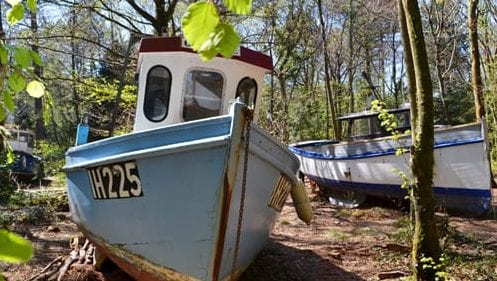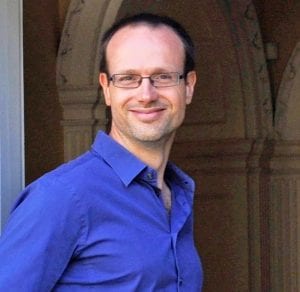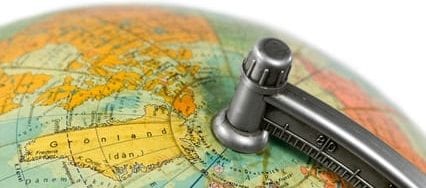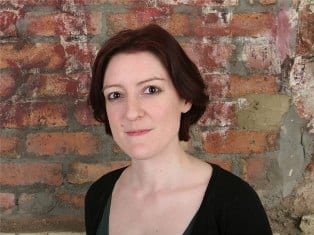This summer, Professor Rich Pancost, Director of the University of Bristol Cabot Institute, will climb aboard an abandoned fishing boat deep within Bristol’s Leigh Woods to talk about some of the pressing issues affecting our oceans – and how we can all help turn the tide on climate change.

Rich’s talk, ‘Changing climate, oceans and food in an Uncertain World’, is one of a number of environmental discussions, theatrical performances and interactive workshops taking place in Leigh Woods, as part of an art installation, Withdrawn, a thought-provoking project that invites us to consider our impact on the marine environment.
‘The ocean is vital but it remains vast and inexplicable,’ explains Rich. ‘That is part of the challenge – we can see the palm oil plantations replacing tropical rain forest, but we can’t see the damage we’re doing to the sea. We don’t “see” ocean acidification and we don’t “see” plastic nanoparticles. This project will help us see these things. And that is why we enjoy working with artists – they enhance our understanding. Of course, they also challenge our understanding and foster new ways of thinking by causing us to slow down and contemplate the world around us.’
Withdrawn is the work of artist, Luke Jerram, who transformed Park Street into a giant water slide last year. The installation has been open to the public since April, and is one of a citywide programme of arts projects during Bristol’s year as European Green Capital that aim to make sustainable living accessible and easy to understand.
During his talk in August, Rich will be joined by local Michelin-starred chef, Josh Eggleton, serving a sustainably caught fish supper (with vegan alternatives). ‘We can have sustainably sourced fish, although it might be a bit more expensive and we might have to enjoy it less frequently,’ says Rich. ‘It’s clear that we must change the way we live in order to live sustainably on the planet, but we’re clever and adaptable. Small actions can make large differences.’
Bristol’s Cabot Institute brings together world-class researchers to tackle some of the most pressing environmental challenges we currently face. And that research is providing leaders and policymakers with the evidence they need to act – to tackle the effects of over-fishing, of ocean acidification, and of excess agricultural run-off into the sea.
‘Extreme global warming events have happened before,’ explains Rich. ‘Sea levels were higher, areas that were flooded are now cities, and our polar regions were covered by verdant forests. Earth’s history tells us that future changes in climate will challenge both people and society, but it also tells us that life is resilient, as is our planet.’
That relationship between people and planet is a key focus for researchers at the Cabot Institute. Rich says: ‘We are all connected – to each other and to our planet. Growing up on a farm – in a farming community – made me acutely aware of how vulnerable we are. So much of life is dictated by outside forces, whether it be the weather or supermarkets or politicians. The dramatic and unpredictable changes to our global environment will affect us all, but it will mostly affect the poor and vulnerable.’
‘In Withdrawn, people made those boats. They worked on them and on the sea, and they passed them on to their children. They did so to earn a living, and their actions fed people. That way of life is almost gone, and Withdrawn prompts valuable introspection on what is no longer here. But it also prompts us to ponder what will come next and to ask whether that is consistent with our values. ‘
‘At Cabot, we study all of these interconnected issues. We study future environmental change and how to ensure our food and water security. We are developing solutions that will underpin the next generation of renewables and energy efficiency measures. We study how communities co-operate so that action can be more effective. And we are exploring how we can live with the climatic, biological and chemical changes we’re making to our planet. As Withdrawn illustrates, we will have to discover how to live in ways that are sustainable and resilient but that are also fair and just.’
_______________________________
What can you do?





